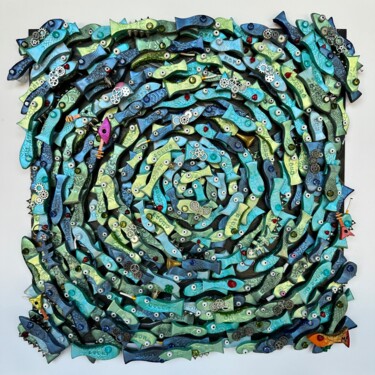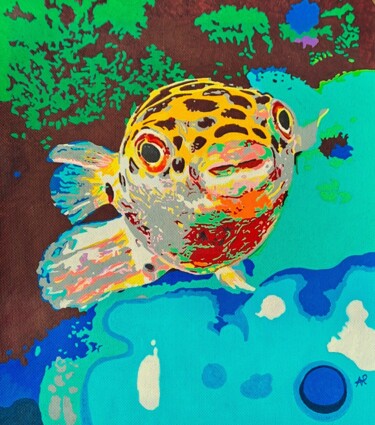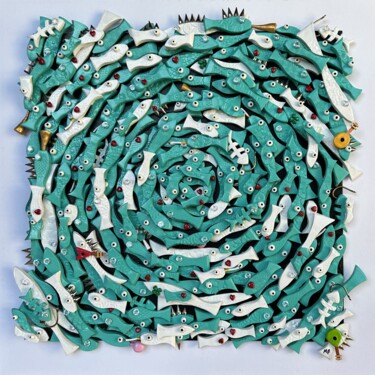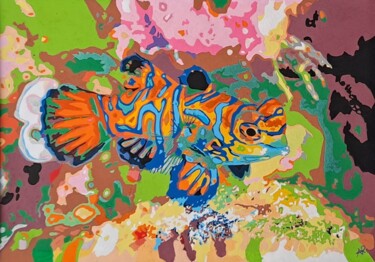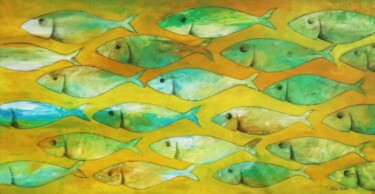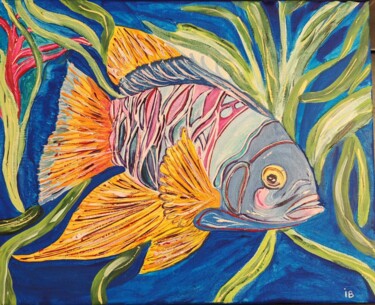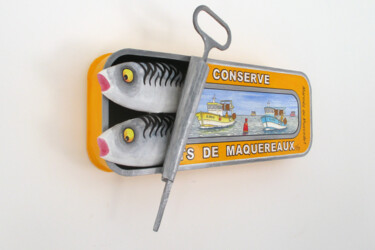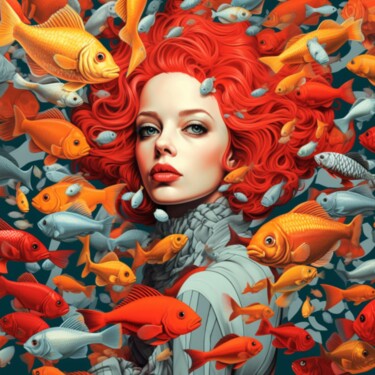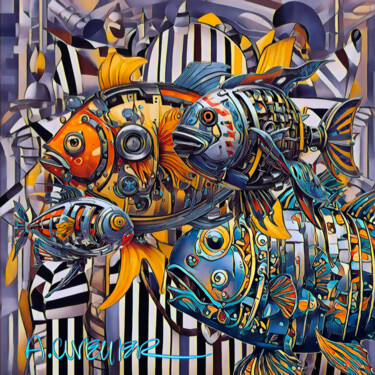
199 Originele kunstwerken, limited editions en prints:
Pop Art is a modern movement born in the middle of the 20th century in Great Britain which will take on a real dimension in the second half of the 20th century in the USA. It then becomes a real American movement. Andy Warhol is the most famous representative of this artistic movement.
Non-elitist, even popular art, it appropriates objects, references or everyday experiences in order to create a work of art. We find all forms of art (painting, sculpture, drawing, installation, etc.) in “non-traditional” Pop art. Artists do not hesitate to use new techniques as well as new supports.
What are the Influences behind Pop Art?
British artist Eduardo Paolozzi creates a collage of a pin-up girl with the Coca-cola brand logo and the word pop. The 1947 painting: "I was a rich Man's Plaything" is considered the first Pop painting in history. In 1952 the artists Richard Hamilton and Eduardo Paolozzi, Alison and Peter Smithson and the art critic Lawrence Halloway founded the group "Independent Group", precursors of the Pop art movement and will present their first exhibition.
The mass consumer society. After the Second World War and the rise of the consumer society, artists appropriated this new culture and put it forward in their creations like Andy Warhol with his boxes of Campbell soup.
From the 1950s and 1960s, pop music became a global phenomenon and inspired artists. Several album covers are made by Pop artists such as the cover of "Sgt. Pepper's Lonely Hearts Club Band" by the Beattles made by Peter Blake. Cinema is also becoming a real phenomenon and will inspire artists like Andy Warhol and his many versions of Marylin.
The explosion of American comics, particularly in the USA in the second half of the 20th century, would have a great influence on many artists such as Roy Lichtenstein, who produced many works that marked the Pop art artistic movement.
What are the techniques used in the artistic movement of pop art?
- The collage: The first works of Pop art are collages created by Eduardo Paolozzi. It is a characteristic method of this new artistic movement. Pasting was little used before. Pop artists use different materials for their collages: magazines, newspapers, posters, fabrics, paper, cardboard, plastics...
- Painting: Artists will favor new painting techniques such as acrylic paint which have just been developed by the chemical industry
- Screen printing: New industrial technique, it allows to reproduce an image in series. The principle of a single painting canvas disappears. Works of art can be reproduced dozens and dozens of times.
What are Famous Artists and Works?
Eduardo Paolozzi (1924-2005)
He is the precursor of pop art. Passionate about science fiction, his first artistic works are collages using advertising clippings using pin-ups or housewives to convey a message against the mass consumer society in his works of art. Paolozzi stayed in Paris, where he met the surrealists, Alberto Giacometti, but above all his interest in art brut made him meet Jean Dubuffet. These meetings will be decisive in the creation of this new form of art.
Peter Blake (1932-)
He created his first collages in 1955. At the start of the 1960s, the artist recovered and mixed the images that we find recurrently in his work: mythical characters, stars of sport, cinema or music. Peter Blake created in 1957, one of the first known works of Pop art: “On the balcony”. The work is now in the collections of Tate Britain museum in London.
Richard Hamilton (1922-2011)
Painter and co-worker, Hamilton is one of the first creators of Pop art. Hamilton is heavily influenced by the works of James Joyce and Marcel Duchamp. He focuses his work on popular culture, mass-produced, youthful and glamorous.
The British artist's collage “Just what is it that makes today's homes so different, so appealing? created in 1956 is in the collections of the Kunsthalle, in Tübingen (Germany).
Andy Warhol (1928-1987)
The emblematic artist of Pop art Andy Warhol (real name Andrew Warhola), born in Pittsburgh, Pennsylvania and died in New York in 1987. He painted in New York in 1961 works of art inspired by American comics. (Advertisement, Before and After, Little King, Saturday's Popeye and Superman). In 1962 Warhol presented a diptych by Marylin Monroe a few months after the artist's death. Fascinated by the silkscreen reproduction process. A technique that was to become Warhol's recognizable style, both simple and quick. The photo of Marylin selected by Warhol is taken from the film "Nigeria", in which Marilyn had played in 1953. The model will be used by him to create many works of art with this image of Marylin that everyone knew.
In 1963 he created "Silver Car Crash (Double Disaster)" From 1965 he worked with many assistants in his New York studio the Factory. The Pop art style somehow barely existed before Warhol became interested in it.
Roy Lichtenstein (1923-1997)
In 1961 Roy Lichtenstein began to paint his first pop works inspired by cartoons and with techniques inspired by the appearance of commercial advertisements, such as "Look Mickey!" Which is now on display at the National Gallery of Art, Washington, DC In the USA.
In 1961, Leo Castelli began presenting his first exhibition of Lichtenstein's work at his New York gallery and he had his first solo exhibition at the gallery, in 1962.
Many other artists are also known for their involvement in the pop art movement such as Robert Rauschenberg, Valerio Adami, John Alcorn, Allan D'Arcangelo, Keith Haring, David Hockney, Jasper Johns, Ed Ruscha...
At the same time in France, influenced by the Pop wave, a particular art movement was developing: “new realism”. The artists will use everyday objects not as "icons" but as components of the work itself. This is the beginning of the use of industrial materials such as concrete, prefabricated sheets, cans...
The artistic movement is marked by the artists Arman, François Dufrêne, Raymond Hains, Yves Klein, Jean Tinguely, Jacques Villeglé or Gérard Deschamps.
Pop art today or "neo pop art"
The artists Murakami, Koons or Hirst are emblematic of the contemporary Pop art trend. Extremely popular Takashi Murakami even collaborates with luxury brands like Louis Vuitton. The "kitsch" balloon sculptures of Jeff Koons, such as the Balloon dog have become symbols known to all.
The works of Fabien Novarino mixing collages, painting, stencils... are a tribute to the culture of entertainment.
What are the defining quotes of the Pop art art movement?
Eduardo Paolozzi
"I don't want to," he said in a conversation with writer JG Ballard and critic Frank Whitford, published on the occasion of his premiere.
major retrospective at the Tate Gallery by the magazine Studio International in October 1971, making images that help people escape from this terrible world. I want to remind them."
Peter Blake
“We are not consciously avant-garde, in front of others. We discover and try to find paths, and two years later, when someone follows the same path, it becomes clear that we were ahead of the others. But, on the other hand, we sometimes try to stay consciously in the background or go back ten years. I tend to play this game, “swimming against the tide”, sometimes consciously and sometimes unconsciously.
Richard Hamilton
“Pop Art: Popular, provisional, disposable, cheap, mass-produced, young, funny, sexy, clever, spectacular and very profitable.”
Andy Warhol
“I like boring things. I like things to be exactly the same over and over again.”
"All boards should be the same size and color so that they would be interchangeable and no one would feel like they had a good one or a bad one."
"Bad taste makes time pass faster."
Roy Lichtenstein
"What marks pop is above all the use it makes of what is despised and it insists on the most practical, the least aesthetic, the most bellowing aspects of advertising."
"Clichés are simple patterns that are striking, memorable, and easy to communicate. They can signify the gist of an idea. They have the potential to become monumental."
Discover contemporary artworks on Artmajeur
Contemporary art is a vibrant constellation of artistic expressions. This creative universe encompasses a wide array of mediums, from paintings, sculpture, and photography to drawing, printmaking, textile art, and digital art, each medium a star shining with its own distinct radiance. Artists use diverse supports and materials to bring their visions to life, such as canvas, wood, metal, and even innovative digital canvases for the creation of virtual masterpieces.
A contemporary painting, for instance, may weave its story through the masterful strokes of acrylic or oil, while a contemporary sculpture might sing its song in the language of stone, bronze, or found objects. The photographic arts capture and manipulate light to produce striking images, while printmaking employs techniques like lithography and screen-printing to produce multiples of a single, impactful image. Textile art plays with fabrics and fibers, whereas digital art pushes the boundaries of creation with innovative technology.
The allure of contemporary art lies in its boundary-pushing nature, its relentless quest for experimentation and its constant reflection of the evolving human experience. This boundless creativity, coupled with its strong social and personal commentary, makes every piece of contemporary art a unique emblem of its time, a mirror held up to the realities and dreams of our complex world. It whispers to us, moves us, provokes thought, and kindles a deep emotional response, stirring the soul of anyone willing to listen. It is, indeed, the language of emotions and ideas, spoken in the dialect of our era.

©2024 Michael Fantozzi
Origins and history of contemporary art
The story of contemporary art unfolds in the mid-20th century, marked by seismic shifts in artistic expression. Post-World War II, around the 1950s and 1960s, artists began experimenting beyond traditional confines, challenging the norms of what art could be. This revolutionary epoch birthed myriad new movements and artistic forms such as abstract expressionism, pop art, and minimalism. Paintings, once confined by realism, embraced abstraction, as artists used color and form to express emotions and ideas. Notable periods like the advent of pop art in the late 1950s and early 1960s saw artworks mimicking popular culture and mass media, reflecting society’s shifting focus.
The sculptural arts, too, witnessed a metamorphosis. Sculptors started to experiment with new materials and forms, often creating artworks that interacted with the viewer and the surrounding space, fostering a sense of engagement. Drawing, a timeless practice, also evolved, with artists incorporating innovative techniques and concepts to redefine its role in contemporary art.
Photography, a relatively new medium, emerged as a powerful tool in the contemporary art landscape. Born in the 19th century, it truly came into its own in the latter half of the 20th century, blurring the lines between fine art and documentation. Printmaking, a practice dating back to ancient times, saw renewed interest and experimentation with techniques like lithography, etching, and screen printing gaining prominence.
The realm of textile art expanded dramatically, as artists began to appreciate the versatility and tactile quality of fabric and fibers. Artists began using textiles to challenge the boundaries between fine art, craft, and design.
The dawn of digital technology in the late 20th century heralded a new age for contemporary art. Digital art emerged as artists started leveraging new technologies to create immersive, interactive experiences, often blurring the line between the virtual and the physical world.
Through these transformative periods, the essence of contemporary art has remained the same: a dynamic, evolving reflection of the times we live in, continually pushing boundaries and embracing the new, always questioning, always exploring.

©2024 Maas Tiir
Evolutions of theses contemporary works in the art market
As we navigate through the 21st century, the dynamic landscape of contemporary art continues to evolve and expand, reflecting our ever-changing world. Contemporary paintings, once primarily confined to two-dimensional canvases, now embrace a multitude of forms and techniques, ranging from mixed media installations to digital creations, each piece a rich a weaving of thoughts, emotions, and narratives. Sculpture, too, has ventured far beyond traditional stone and bronze, with artists incorporating light, sound, and even motion, embodying the ephemerality and flux of the modern world.
Photography, in the hands of contemporary artists, has expanded its horizons, seamlessly blending with digital technology to create breathtaking imagery that challenges our perception of reality. Drawing, as well, has transcended the borders of paper, incorporating multimedia elements and exploratory techniques to redefine its role in the artistic discourse. Printmaking continues to flourish, with contemporary artists using traditional methods in innovative ways to deliver potent social and personal commentaries.
Textile art, once considered a craft, now holds a prominent place in the contemporary art world, with artists using it to explore issues of identity, tradition, and cultural heritage. Meanwhile, digital art, the newest member of the contemporary art family, has revolutionized the way we create and interact with art, presenting immersive experiences that blur the boundary between the virtual and the physical.
These diverse forms of contemporary art hold significant value in the current art market, not only due to their aesthetic appeal but also their ability to encapsulate and communicate complex ideas and emotions. Collectors, curators, and art lovers worldwide seek these works, drawn to their inherent dynamism, their innovative use of materials, and their eloquent expressions of our shared human experience. As a testimonial to our times, these contemporary artworks encapsulate the pulse of our society and the resonance of individual voices, forever etching our collective narrative into the annals of art history.

©2024 Michael Fantozzi
Famous Contemporary Artists
As we delve into the vibrant realm of contemporary art, we encounter an array of artists who shape this dynamic field. Each a master in their medium - painting, sculpture, photography, drawing, printmaking, textile, or digital art - they push artistic boundaries, reflecting our era and challenging perceptions. Let’s explore these remarkable contributors and their groundbreaking works.
1. Gerhard Richter - Known for his multi-faceted approach to painting, Richter challenges the boundaries of the medium, masterfully oscillating between abstract and photorealistic styles. His works, whether featuring squeegee-pulled pigments or blurred photographic images, engage in a fascinating dialogue with perception.
2. Jeff Koons - A significant figure in contemporary sculpture, Koons crafts monumental pieces that explore themes of consumerism, taste, and popular culture. His iconic balloon animals, constructed in mirror-polished stainless steel, captivate with their playful yet profound commentary.
3. Cindy Sherman - An acclaimed photographer, Sherman uses her lens to explore identity and societal roles, particularly of women. Renowned for her conceptual self-portraits, she assumes myriad characters, pushing the boundaries of photography as a medium of artistic expression.
4. David Hockney - Hockney, with his prolific output spanning six decades, is a pivotal figure in contemporary drawing. His bold use of color and playful exploration of perspective convey an intoxicating sense of joy and an unabashed celebration of life.
5. Kiki Smith - An innovative printmaker, Smith’s work explores the human condition, particularly the female body and its social and cultural connotations. Her etchings and lithographs speak to universal experiences of life, death, and transformation.
6. El Anatsui - A master of textile art, Anatsui creates stunning tapestry-like installations from discarded bottle caps and aluminum scraps. These shimmering, flexible sculptures blend traditional African aesthetic with contemporary art sensibilities, speaking to themes of consumption, waste, and the interconnectedness of our world.
7. Rafael Lozano-Hemmer - A leading figure in digital art, Lozano-Hemmer utilizes technology to create interactive installations that blend architecture and performance art. His work, often participatory in nature, explores themes of surveillance, privacy, and the relationship between people and their environments.

©2024 Michael Fantozzi
Notable contemporary artworks
The contemporary art landscape is a dynamic patchwork of diverse expressions and groundbreaking ideas, each artwork a unique dialog with its audience. Here are a selection of some renowned contemporary artworks, spanning various media such as painting, sculpture, photography, drawing, printmaking, textile art, and digital art, that have profoundly influenced this vibrant movement.
"Cloud Gate" by Anish Kapoor, 2006 - This monumental stainless steel sculpture, also known as "The Bean," mirrors and distorts the Chicago skyline and onlookers in its seamless, liquid-like surface, creating an interactive experience that blurs the line between the artwork and the viewer.
"Marilyn Diptych" by Andy Warhol, 1962 - An iconic piece of pop art, this silkscreen painting features fifty images of Marilyn Monroe. Half brightly colored, half in black and white, it reflects the dichotomy of celebrity life and its influence on popular culture.
"Rhein II" by Andreas Gursky, 1999 - This photographic artwork, a digitally-altered image of the Rhine River, is celebrated for its minimalist aesthetic. It strips the landscape to its bare essentials, invoking a sense of tranquility and vastness.
"Black Square" by Kazimir Malevich, 1915 - A revolutionary painting in the realm of abstract art, this piece, featuring nothing more than a black square on a white field, challenges traditional notions of representation, symbolizing a new era in artistic expression.
"Puppy" by Jeff Koons, 1992 - This giant sculpture, a West Highland Terrier blanketed in flowering plants, explores themes of innocence, consumer culture, and the interplay between high art and kitsch. It’s a delightful blend of traditional sculpture and garden craft.
"Re-projection: Hoerengracht" by Ed and Nancy Kienholz, 1983-1988 - A room-sized tableau representing Amsterdam’s red-light district, this work combines elements of sculpture, painting, lighting, and found objects. It engages viewers in a stark commentary on commodification and objectification.
"Untitled" (Your body is a battleground) by Barbara Kruger, 1989 - This photomontage, combining black-and-white photography with impactful text, explores issues of feminism, identity, and power. Its potent, confrontational message is a prime example of the power of text in contemporary visual art.
"For the Love of God" by Damien Hirst, 2007 - This sculpture, a platinum cast of a human skull encrusted with 8,601 diamonds, probes themes of mortality, value, and the human fascination with luxury and decadence. It’s a compelling blend of macabre and magnificence.
"Physical impossibility of Death in the Mind of Someone Living" by Damien Hirst, 1991 - This artwork, featuring a tiger shark preserved in formaldehyde, blurs the line between traditional sculpture and biological specimen. It prompts viewers to contemplate mortality and nature’s ferocity.
"One and Three Chairs" by Joseph Kosuth, 1965 - A piece of conceptual art, it presents a physical chair, a photograph of a chair, and a dictionary definition of a chair, thus exploring the relationship between language, picture, and referent in art.
These pieces, in their diversity, exemplify the rich tapestry of contemporary art, each piece a unique commentary on our world and a testament to the limitless potential of creative expression.


Michael Fantozzi
Klei op Canvas | 19,7x19,7 in

Maas Tiir
Sculptuur - Gietwerk | 10x11,4 in
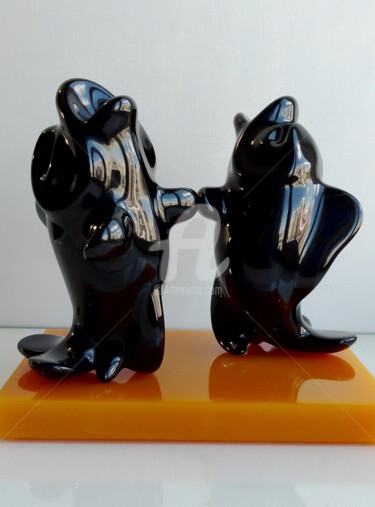
Maas Tiir
Sculptuur - Hars | 10,2x11,4 in

Maas Tiir
Sculptuur - Hars | 6,7x11,4 in
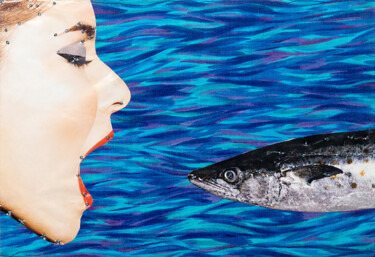
Lena Ash
Collages op Stof | 7,9x11,8 in
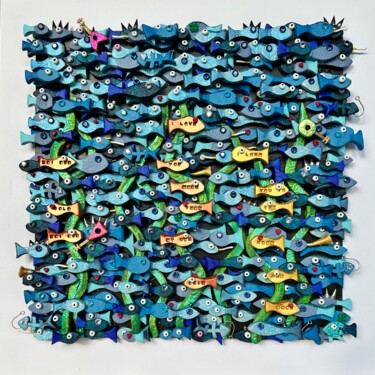
Michael Fantozzi
Acryl op MDF-plaat | 19,7x19,7 in
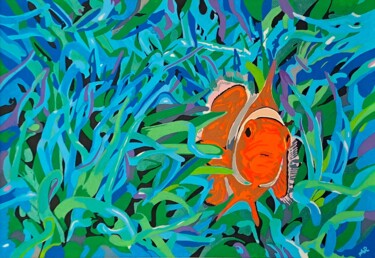
Pascale Alloncle
Acryl op Papier | 7,9x11 in

Irinjoyart
Aquarel op Papier | 10x8 in

Maas Tiir
Sculptuur - Hars | 5,1x8,7 in

Maas Tiir
Sculptuur - Gietwerk | 10x11,4 in
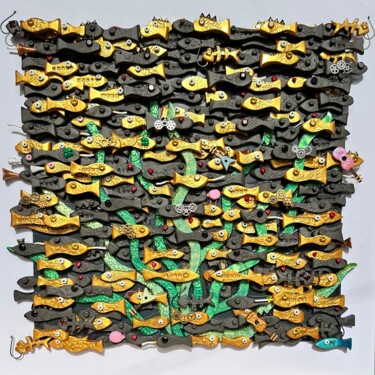
Michael Fantozzi
Acryl op MDF-plaat | 19,7x19,7 in
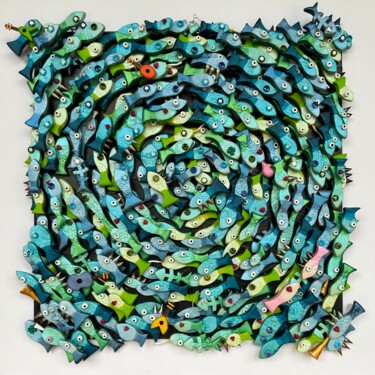
Michael Fantozzi
Acryl op Canvas | 19,7x19,7 in

Irinjoyart
Olie op Canvas | 8x10,1 in
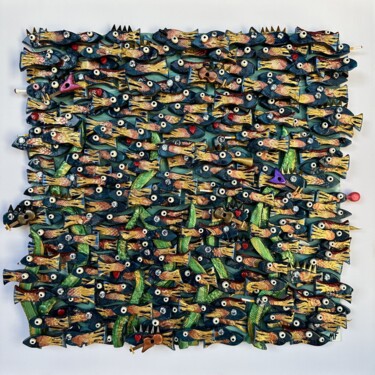
Michael Fantozzi
Acryl op MDF-plaat | 15,8x15,8 in
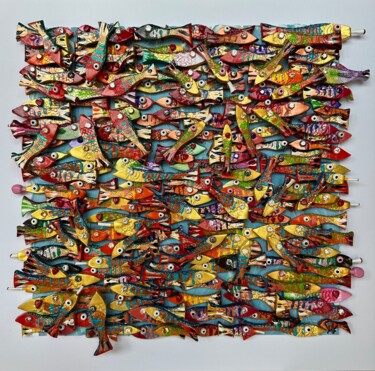
Michael Fantozzi
Design | 15,8x15,8 in

Michael Fantozzi
Acryl op Canvas | 19,7x19,7 in

Maas Tiir
Sculptuur - Gips | 5,1x8,7 in
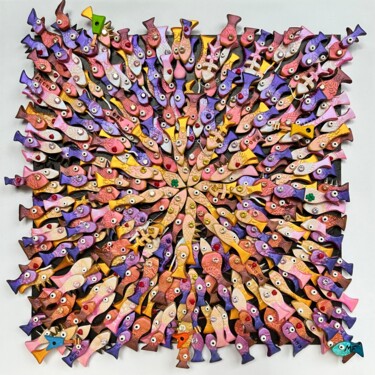
Michael Fantozzi
Acryl op Canvas | 19,7x19,7 in
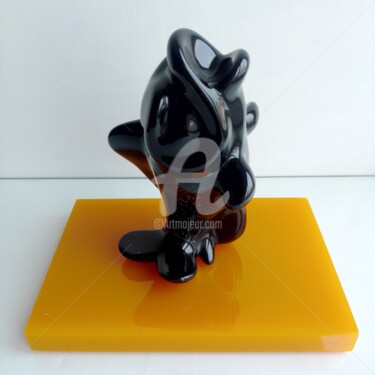
Maas Tiir
Sculptuur - Hars | 10,2x11,4 in
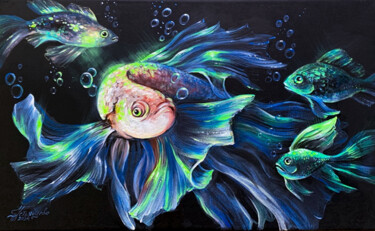
Tatyana Ustyantseva
Acryl op Canvas | 11,8x19,7 in
